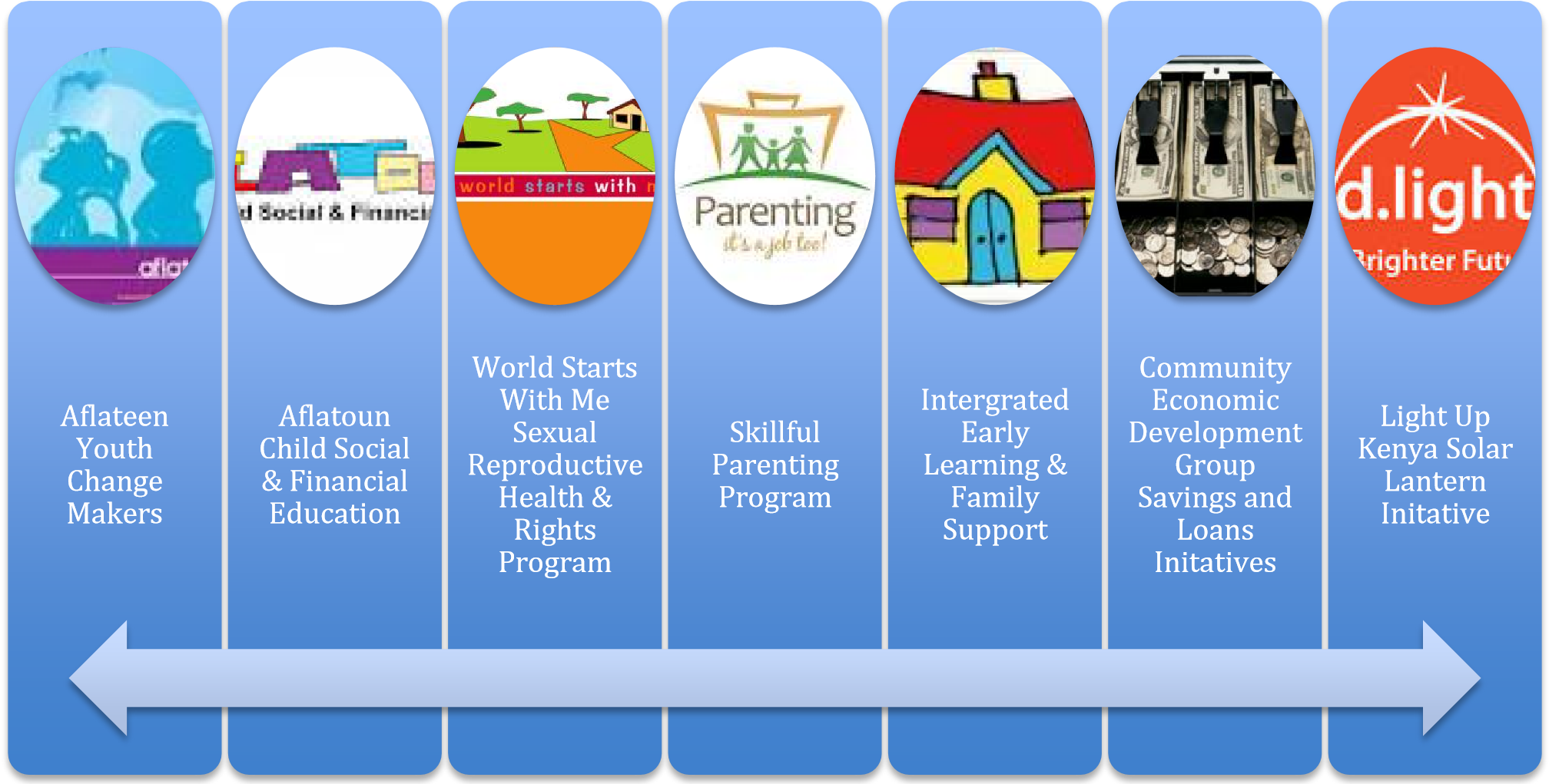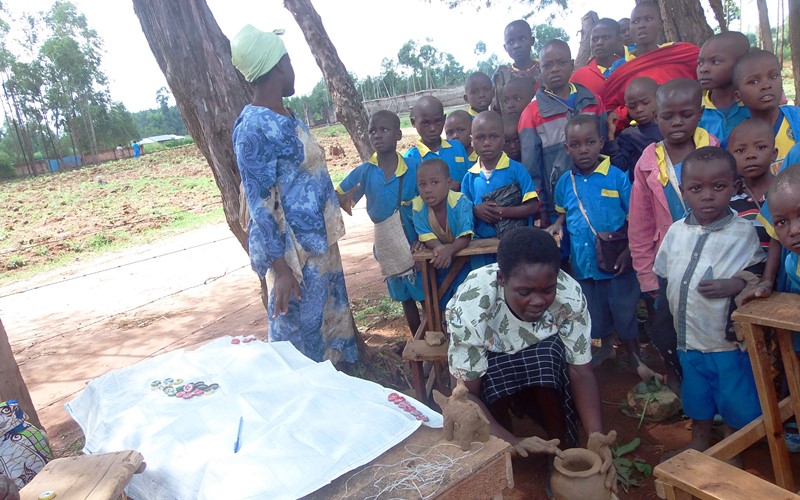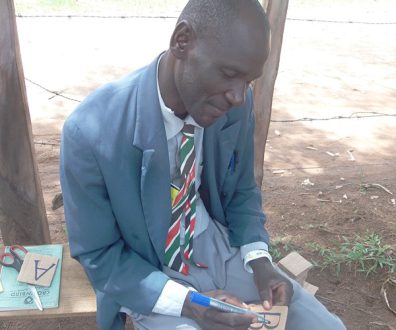Our Programs

Skillful Parenting Program
Working with parents and community members, this comprehensive program strengthens communities by promoting social relationships, rights and responsibilities for children and parents.
Integrated Early Learning & Family Support
This project aims at promoting cognitive, social, emotional and physical development of children in early childhood centers in Kakamega county to ensure their successful transition into primary school.
Group Savings & Loans Initiatives
These initiatives support the social and economic wellbeing of members and their families, by supporting the sharing of knowledge and skills in savings, loans and income generating activities.
Aflateen Youth Change Makers Program
Is a social and financial educational program for young people 15 to 18 years. Using an interactive and ICT based platform, young people are supported in becoming agents of change in their social-cultural, environmental and economic worlds- as ‘People, Planet and Profit’, acquiring skills and knowledge in planning, saving and spending and engaging inincome generating enterprise.
Aflatoun
Is an international social and financial educational program for children 6 to 14 years. Via interactive learning models including: child rights and responsibilities, saving, spending, planning, budgeting, and enterprise- children are empowered to become agents of change in their own lives and communities.
World Starts With Me
Is a Sexual and Reproductive Health and Rights curriculum developed by Rutgers (WFP) for young people 12 to 19 years. Using an interactive and ICT based platform, young people develop an understanding of SRH, their rights and invaluable life skills for adolescent development.
Light Up Kenya Solar Lantern Initiative
This project, working alongside participating schools, provides sufficient lighting in rural homes. Promoting healthier and environmentally friendly outcomes through the reduction of fuel consumption and exposure to harmful fumes. The initiative promotes safer home, work and study environments for communities.Learn more about this initiative.
Ways of Working
1. Application of sustainable program and development principles through education, participation and growth.
2. Embracing community development opportunities
3. Building on individual and community strengths
4. Engaging young people and their communities
5. Advocating for vulnerable people and their communities
6. Focusing on prevention through early intervention
7. Working with partners and avoiding duplication
8. Acting on evidence
9. Responding to community needs and demand
10. Focusing on areas of locational disadvantage to help build stronger communities
11. Embracing diversity
12. Ensuring gender is a key consideration in all activities
Five Priority Areas
We focus our work with the most vulnerable people and communities in Western Province, Kenya.
1. Strengthening entrepreneurial knowledge and skills through education.
2. Increasing environmental conservation, by distributing and promoting environmentally friendly alternatives.
3. Delivering health promotion knowledge and skills
4. Buildings skills in Information, Communication and Technology.
5. Increasing and supporting the ability of self-reliance within communities.
About ECDE
- Background
The county has 1,943 ECD centres and 1,621 ECD teachers. The teacher pupil ratio in the pre-primary school is 1:46. The total enrollment in this category is 75,135 representing 4.5 per cent of the county population. The pre-primary level has a retention rate of 99.1 per cent with a dropout rate of 0.9 per cent. The transition rate is 90 per cent. Most of the ECDE centres are privately owned. There should be deliberate efforts to construct ECDE centres in every primary school, equipping and hiring of teachers.
- Under age children are in some of the ECDE centres in the County; as young as 2 years. Wrong entry age at ECDE will be proliferated throughout education cycle.
- Net enrolment rate at ECDE is 46% in 2012. Challenges include insufficient number of pre-primary and day care centres, limited availability of teaching and learning materials, limited community participation and inadequate nutritional and health services.
- The renumeration of ECDE teachers along with the working environment have a negative impact on the enrolment trends. Due to irregular payment of ECDE teachers salaries, they are demotivated.
- Some of the ECDE teachers are untrained and have no experience and capacity to embrace a holistic and integrated view of early childhood services.


2. Purpose and Objectives
To improve holistic development of children at ECDE level in Kakamega and Busia Counties.
- Objective 1: Increase access to quality ECDE services by 15%.
- Objective 2: Train parents in Integrated ECDE and parenting for improved care of children and support to ECDE centres.
- Objective 3: To link ECDE centres to other community support services.
- Objective 4: To improve the nutritional requirements of children and families at 8 ECDE Centres in Busia and Kakamega Counties through provision of yellow fleshed sweet potatoes.
- Objective 5: To improve the capacity of ECDE management committees for effective governance and accountability to ECDE parents and community.
3. Key Activities and Achievements
Key activities implemented include training of ECD management committees, parents on parenting skills and ECD management, resource centre set up at the ECD centres, stakeholder mapping and review of the programme progress with stakeholders. Parents came up with an activity plan after the training detailing activities they were to carry out for the next six months together with the children and ECDE teachers supported by the management committee.
The activities carried out included inviting parents for songs, poems and storytelling, health talk to children, committee meeting with ECDE teachers monthly, learning and playing materials making by parents, learning corners organized per school per ECDE class, parents discussion meetings per month, activities in mother tongue to children, parents and committee members visits the ECD centre for monitoring and discussions and exchange visit from centre A to centre B for learning purpose.
- Pupil Enrolment has increased. This is attributed to the parents understanding their role in early childhood care, development and education.
- ECD teachers reported improved pupil attendance.
- Child friendly learning environment. Parents, teachers and school administration communicate, provide teaching, learning and play materials and support each other in the learning of children.
- Collaboration and support by other players especially health workers. The collaboration is helpful in improving the health of children and parents.
- The relationship between ECD teachers and parents has improved.
- ACDT Participated in the a radio discussion on parenting and early childhood to communicated aspects of parenting and children education and child rearing skills in general.
- Recognition of ECD teachers by other teachers and parents and appreciation of their role in Education.
- Improved ECD teacher remuneration. Parents understand what goes on at ECD centres and they are involved in the learning education process for their children.
- Setting up a resource centre in each of the two ECD centres.
- Two ECD centre management committees re-constituted.
| ACTIVITY | ACHIEVEMENT |
| Consultations and identification of ECD centres and collection of initial information | Ø Two ECD centres -Kharanda and Lusumu ECD centres identified. Ø Initation information report about the two ECD centres. Ø Navakholo District Education officer and District Centre for Early Childhood Centre Programme Centres approved the programme. |
| Induction to ECD centre management and government officials and parents | Ø Two ECD management committees re-constituted. Ø 184 participants inducted. Ø Induction report developed. |
| Training of ECD care givers and management on integrated ECD management | Ø 131 care givers trained. Ø Training report of ECD care givers and management on integrated ECD developed. |
| Identify and equip the resource centres with learning materials | Ø Two resource centres set up at Lusumu and Kharanda ECD centres and equipped with reading materials from PAN. |
| ECDE and parents develop action plans | Ø Two action plans developed. Ø 120 parents participated in the action plan activity. |
| Stakeholder mapping and linkage to the Integrated ECD centre | Ø Stakeholders identified and documented in a report. |
| Monitoring and assessment of parenting, ECD, referrals, and parenting activities implementation progress and evidence of change | Ø Monitoring visits done to the ECD centres. Progress made documented in ACDT monthly reports. |
| Review of program implementation and outcomes with key stakeholders and ECD centres | Ø A review meeting was held and attended by parents, teachers, local leaders and NGOs and a report of the review meeting developed. |
| Documentation | Ø Report describing step by step of setting up ECD with integrated services developed and Policy paper development ongoing. |
| ECD management committee members trained | Ø 19 (11 female, 8 male) ECD committee members trained. |
- Response to the project by parents, teachers, local leaders and other stakeholders was very positive. However, the implementation period was short.. It may be necessary to continue with the project to sustain the quick gains achieved and ensure support is available in the process of continued implementation.
- For schools, it may be necessary to reconstitute ECDE management committees where they do not exist to ensure they are in place to support the programme and parents during the training period.
- For sustainability, scale up and mentorship, formation of a parents peer support group is necessary to ensure continuity in mobilising, sensitizing, mentoring and supporting other parents. Such group will require additional training in dramatization, communication and facilitation to be effective in their assignment.
- Head teachers and school management require a separate training perhaps for two days prior to the parents training to keep them informed and aware of the programme and support the skilful parenting in their school communities.
- Working with County Government to build the capacity of ECDE teachers and parents in holistic early childhood development and skilful parenting is key.
Open Your Heart
Join Us in Making a Difference
Your support can change lives and build a brighter future. Together, we can make a lasting impact on the children and families of Western Kenya. Explore our website to learn more about our work, and consider donating now or getting involved to help us in our mission